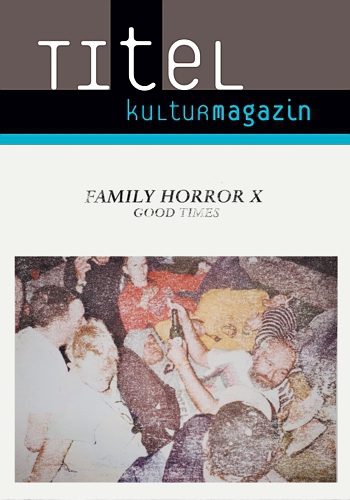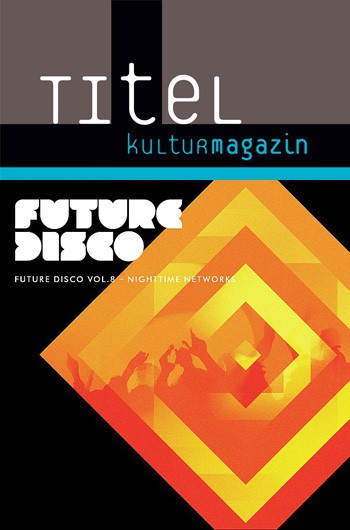Bittles‘ Magazine
Sonic Boom is not only a fantastic name for a band, it is also the nom de plume of Peter ›Sonic Boom‹ Kember, who was one of the founding members of the exceedingly excellent Spacemen 3. Spectrum is the only commercially available album he ever released under this name, yet it still stands as a momentous record that bewitches with its dense, layered sound. Released over 20 years ago, it isn’t of its time, or this time, or any time. In fact it is something else, separated from trends, fads or anything else which dilutes music to a turgid meaningless mess. By JOHN BITTLES
Peter’s first band Spacemen 3 saw him, and close friend Jason Pierce (who later went on to form Spiritualized) play together with a varied assortment of musicians all linked together in their love of weird psychedelic rock. For almost ten years the band gave the world the type of scuzzy garage noise that most lost and alienated young teens only ever see in particularly vivid wet dreams.

Photo by Xi Weg
Yet, it is his debut solo album that I want to talk about here. Spectrum, the album from which he was to get his next band’s name was recorded mostly in 1989 and released in 1990, just before the split of Spacemen 3. To sum up it is a gloriously hazed album that has pretty much been a constant throughout my life. Horribly neglected by the press, it is a vivid all-encompassing dreamscape that deserves to be regarded as one of the finest works of art ever to see the light. At the time he cited films and ambience as the main inspirations behind the record’s laid-back sound, something you can hear all too well.
While the nation was raving in fields, or chasing after the very first rumblings of Madchester, Spectrum was a brave, deeply introspective, narcotic trip that saw the creator explore the inner workings of his soul. The record contains seven songs that meander, glide and give the very air a sedate and subdued haze. Decidedly druggy and with a slow, blessed-out vibe, the album made no attempt to conform or adhere to the rigid verse chorus verse concept which is still such a dominant force in rock.
The slurred, gospel-like feel of opener Help Me Please works as a spiritual and spine-tingling introduction to the Sonic Boom sound. Lyrics like ’Help me Lord. Oh, you know I try. I ain’t gonna get out of this world alive.’ and ‘Gonna take my gun. Gonna take my life’ welcome the listener into a dark and sinister world with their plaintive, hopeless plea. Sounding almost like a nursery rhyme the track is a gorgeous wallow of despair that is the epitome of apathy and dejection yet still finds itself questioning if there is something more to life.
Lonely Avenue quickly follows and continues the aural depiction of loneliness and melancholy that is a constant thread throughout the album as a whole. The songs refrain of »Now I can cry. Oh I can die. I live on a lonely, lonely avenue.« tells you just about all you need to know. By now you will either have given yourself up completely to the self-obsessed miserable world that the album inhabits, or you will be sitting about thinking ‘Bit fucking depressing, this isn’t it?’
Reminiscent of a lost Velvet Underground track Angel growls with a righteous sense of anger which joins beautifully with the previous songs’ despair. With Peter’s voice backed by a gently picked bass and soft clicks that may or may not be handclaps the listener actually strains to hear what is going on until around the 90 second mark when an electric guitar suddenly crashes in. Abruptly an organ also enters the fray, and the track builds and builds, adding elements one piece at a time, until you feel completely invigorated and have had your faith in life renewed.
Rock ‘n’ Roll Is Killing My Life is a cover of an old Suicide song, yet Peter Kember sings as though he feels each and every word and well and truly makes them his own. His vocals are accompanied by a swirling organ riff and scampering hi-hats before a gorgeous wall of sound kicks in and threatens to sweep your head and heart away. In many ways this is the centre-point of the entire album and gives the record its beating heart. Here was someone who had seen enough of the rock ‘n’ rock lifestyle, yet couldn’t give it up because it was in his very soul.
Next up, You’re The One almost resembles a traditional rock record and even recalls The Rolling Stones or Rocks era Primal Scream in its brash swagger. The vocals strain to be heard over the crashing guitars and once again the listener has to work hard to decipher the lyrics.The track works beautifully as a revitalising and rejuvenating lift, saving the listener from being completely enveloped in the ongoing fug of depression which somewhat consumes the album’s other six songs.
Pretty Baby sees us taken back to the hazed, slightly narcoleptic vibe of before with its ode to a nameless love set over a sixties sounding organ drone. It somehow manages to sound both still and dangerous as we question who, or what is the object of such devotion and affection. Lyrics such as ‘I’m gonna ask her if she’ll marry me. Cause she makes me as happy as a boy can be.’ manage to capture both a sense of naivety and longing that lends the song an almost sensual air. I mean its hardly Barry White, yet, if you find a partner who will cuddle up with you to this song then you are a very lucky person indeed.
Not as romantic, yet no less good comes the album closer; the nine minute long contemplative sigh that is If I Should Die. The song is, quite simply, a gorgeous meditation on life and death. It is a soft, meandering journey that seemingly has no-where to go. Yet, sometimes it is the journey itself that is far more interesting than any destination could ever hope to be. As proves to be the case here. The album finishes with not a boom, or a bang, but a rather disconsolate sigh. Meaning you have two choices, either play the whole thing again, or go back to the mundanity of your everyday life. For depressives like me it isn’t even a choice.
The production on the album as a whole is quite lo-fi and minimal with no more than three or four elements at work at any one time. This lends the record’s songs more than adequate room to breath, together with a real sense of absence that is one of the album’s best features. This sense of loss and of something missing fits in perfectly with the subject matter of many of the songs helping create a sense of depth and emptiness that help it become a vital part of your life.
Not long after the album was released Spacemen 3 broke up and the band Spectrum was born. And yes, this album can be seen as a break-up record; a very good one at that. Yet, it is also so much more! It is one of those records that somehow have the power to seep their way into your subconscious and come to define a certain period of your life. I didn’t listen to this album for ten years after going through a bad break-up and then playing these songs to death. But, a few years ago I picked it up again. Which was one of the better decisions that I have ever made.










